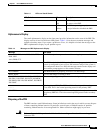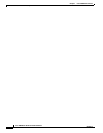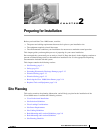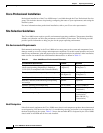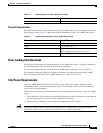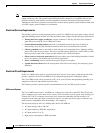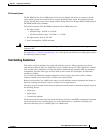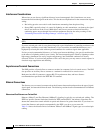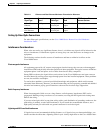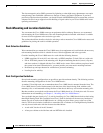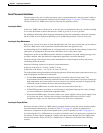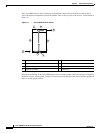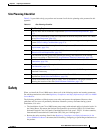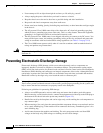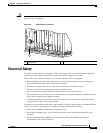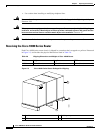
2-7
Cisco 10008 Router Hardware Installation Guide
OL-0659-13
Chapter 2 Preparing for Installation
Site Planning
Setting Up Fiber-Optic Connections
For other fiber-optic specifications, see the Cisco 10000 Series Routers Line Card Hardware
Installation Guide.
Interference Considerations
When wires are run for any significant distance, there is a risk that stray signals will be induced on the
wires as interference. If interference signals are strong, they can cause data errors or damage to the
equipment.
The following sections describe sources of interference and how to minimize its effects on the
Cisco 10008 router.
Electromagnetic Interference
All equipment powered by AC current can propagate electrical energy that can cause electromagnetic
interference (EMI) and possibly affect the operation of other equipment. The typical sources of EMI are
equipment power cords and power service cables from electric utility companies.
Strong EMI can destroy the signal drivers and receivers in the Cisco 10008 router and even create an
electrical hazard by causing power surges through power lines into installed equipment. These problems
are rare, but could be catastrophic.
To resolve these problems, you need specialized knowledge and equipment, which could consume
substantial time and money. However, you should ensure that you have a properly grounded and shielded
electrical environment, paying special attention to the need for electrical surge suppression.
Radio Frequency Interference
When electromagnetic fields act over a long distance, radio frequency interference (RFI) can be
propagated. Building wiring can often act as an antenna, receiving the RFI signals and creating more
EMI on the wiring.
If you use twisted-pair cable in your plant wiring with a good distribution of grounding conductors, the
plant wiring is unlikely to emit radio interference. If you exceed the recommended distances, use a
high-quality twisted-pair cable with one ground conductor for each data signal.
Lightning and AC Power Fault Interference
If signal wires exceed recommended cabling distances, or if signal wires pass between buildings, you
should consider the effect that a lightning strike in your vicinity might have on the Cisco 10008 router.
Table 2-4 Ethernet and Fast Ethernet Maximum Transmission Distances
Signal Type
Transceiver
Speed Cable Type
Transmission
Mode
IEEE Maximum Distance
Between Stations
10BaseT
Ethernet
10 Mbps Category 3
twisted-pair
Full and half
duplex
328 ft (100 m)
100BaseT
Fast Ethernet
100 Mbps Category 5
twisted-pair
Full and half
duplex
328 ft (100 m)



